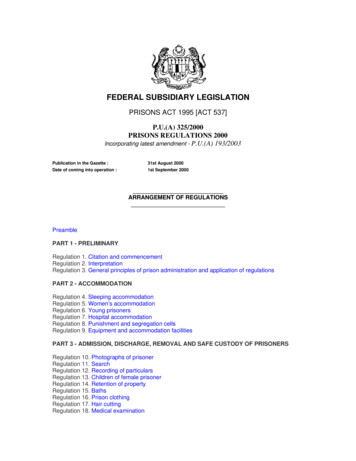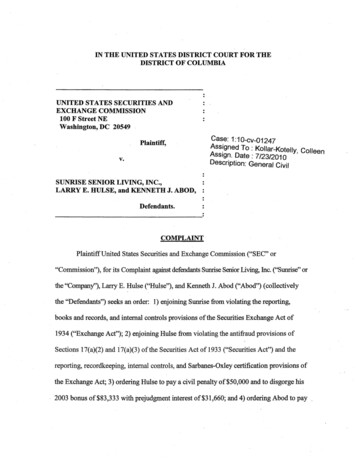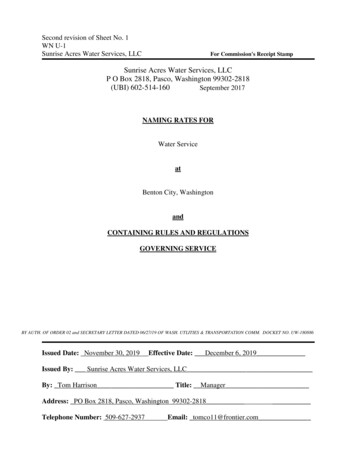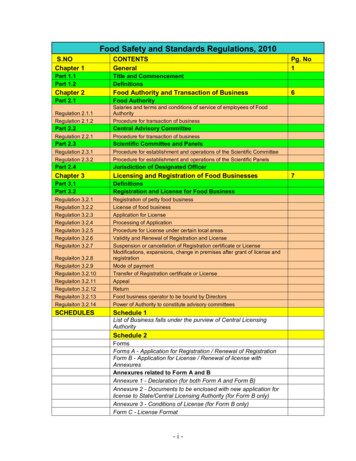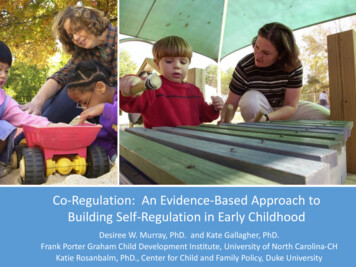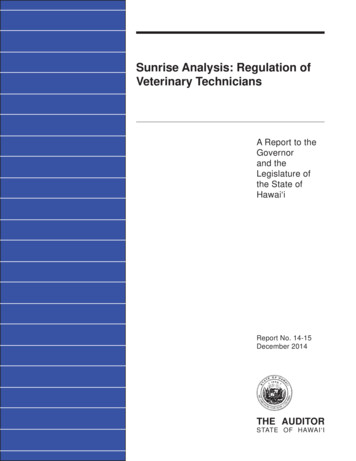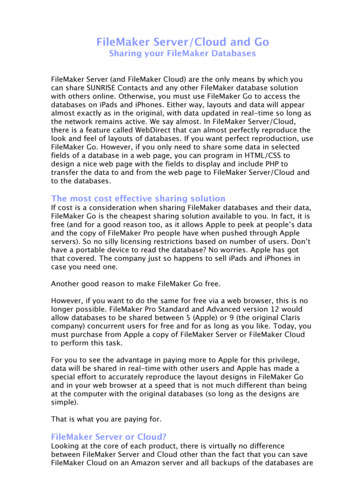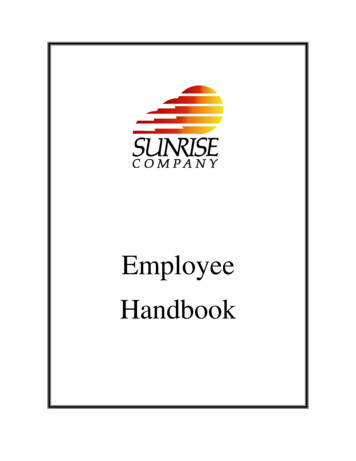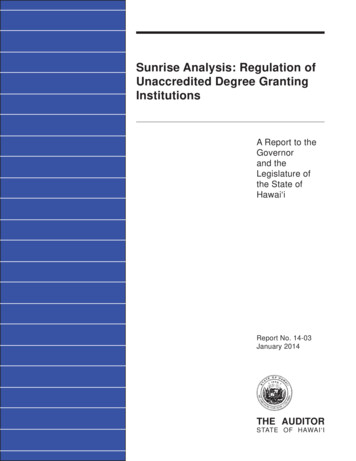
Transcription
Sunrise Analysis: Regulation ofUnaccredited Degree GrantingInstitutionsA Report to theGovernorand theLegislature ofthe State ofHawai‘iReport No. 14-03January 2014THE AUDITORSTATE OF HAWAI‘I
Office of the AuditorThe missions of the Office of the Auditor are assigned by the Hawai‘i State Constitution(Article VII, Section 10). The primary mission is to conduct post audits of the transactions,accounts, programs, and performance of public agencies. A supplemental mission is toconduct such other investigations and prepare such additional reports as may be directedby the Legislature.Under its assigned missions, the office conducts the following types of examinations:1.Financial audits attest to the fairness of the financial statements of agencies. Theyexamine the adequacy of the financial records and accounting and internal controls,and they determine the legality and propriety of expenditures.2.Management audits, which are also referred to as performance audits, examine theeffectiveness of programs or the efficiency of agencies or both. These audits arealso called program audits, when they focus on whether programs are attaining theobjectives and results expected of them, and operations audits, when they examinehow well agencies are organized and managed and how efficiently they acquire andutilize resources.3.Sunset evaluations evaluate new professional and occupational licensing programs todetermine whether the programs should be terminated, continued, or modified. Theseevaluations are conducted in accordance with criteria established by statute.4.Sunrise analyses are similar to sunset evaluations, but they apply to proposed ratherthan existing regulatory programs. Before a new professional and occupationallicensing program can be enacted, the statutes require that the measure be analyzedby the Office of the Auditor as to its probable effects.5.Health insurance analyses examine bills that propose to mandate certain healthinsurance benefits. Such bills cannot be enacted unless they are referred to the Officeof the Auditor for an assessment of the social and financial impact of the proposedmeasure.6.Analyses of proposed special funds and existing trust and revolving funds determine ifproposals to establish these funds are existing funds meet legislative criteria.7.Procurement compliance audits and other procurement-related monitoring assist theLegislature in overseeing government procurement practices.8.Fiscal accountability reports analyze expenditures by the state Department ofEducation in various areas.9.Special studies respond to requests from both houses of the Legislature. The studiesusually address specific problems for which the Legislature is seeking solutions.Hawai‘i’s laws provide the Auditor with broad powers to examine all books, records,files, papers, and documents and all financial affairs of every agency. The Auditor alsohas the authority to summon persons to produce records and to question persons underoath. However, the Office of the Auditor exercises no control function, and its authority islimited to reviewing, evaluating, and reporting on its findings and recommendations to theLegislature and the Governor.THE AUDITORSTATE OF HAWAI‘IKekuanao‘a Building465 S. King Street, Room 500Honolulu, Hawai‘i 96813
Sunrise Analysis: Regulation of UnaccreditedDegree Granting InstitutionsReport No. 14-03, January 2014Proposed regulation is not warranted, as existing laws providesufϔicient consumer protectionOffice of the Auditor465 S. King StreetRm. 500Honolulu, HI 96813Ph. (808) 587-0800Jan K. YamaneActing State AuditorState of Hawai‘iComplaints againstUDGIs in 2005239Complaints againstUDGIs in 20131OCP actions filed againstUDGIs, 1997–201251HB 1200, HD 2 is not reasonably necessary to protect the publicHouse Bill No. 1200, House Draft 2, is not needed to comply with the Higher Education Act of 1965and other flaws in the bill do not warrant its enactment. The proposed regulation is unwarranted, asrecent legislation has changed the legal landscape and the bill has several flaws. For instance, apost-secondary education program now exists within the Department of Commerce and ConsumerAffairs (DCCA), whereas the bill proposes to place a commission there. More importantly, the billdoes not specify a regulatory framework; that is, it does not state whether it would require licensure,certification, or registration for unaccredited degree granting institutions. We found the cost ofregulation would be prohibitive, at nearly twice the fees for accredited institutions. These costs wouldlikely translate to higher costs for consumers and restrict entry into the field for other unaccreditedinstitutions. There have been numerous complaints against unaccredited degree granting institutions,but these have declined considerably in recent years, from a peak of 239 in 2005 to one in 2013.Existing laws protect consumersThe purpose of Chapter 446E, HRS, is consumer welfare, and although Hawai‘i has a reputation forlax regulation of diploma mills, it is also known for actively prosecuting them. Enforcement by DCCA’sOffice of Consumer Protection against unaccredited degree granting institutions for violations ofprohibited practices under existing laws in Chapter 446E, Hawai‘i Revised Statutes (HRS), providessufficient consumer protection. All states, including Hawai‘i, have laws addressing unaccreditedinstitutions. Hawai‘i’s law already covers online entities.Most of LRB’s 1993 recommendations have been addressedSix of the nine recommendations in the Legislative Reference Bureau’s 1993 Report No. 5, PrivateAccreditation and State Authorization of Degree Granting and Non-degree Granting Institutions inHawai‘i, have been addressed.Agency responseRecommendationsResponsePrior StudiesFor the full text of this andother reports, visit our website:http://auditor.hawaii.gov/The DCCA concurred with our conclusion that a post-secondary authorization program regulatingUDGIs is unnecessary. Regarding the number of UDGIs physically located in Hawai‘i, DCCA pointedout that its database of business registrants is not limited to UDGIs and there may be UDGIs operatingwithout a business registration, as registration is not mandatory.
Sunrise Analysis: Regulation ofUnaccredited Degree GrantingInstitutionsA Report to theGovernorand theLegislature ofthe State ofHawai‘iSubmitted byTHE AUDITORSTATE OF HAWAI‘IReport No. 14-03January 2014
ForewordThis analysis of the regulation of unaccredited degree grantinginstitutions was prepared pursuant to Senate Concurrent ResolutionNo. 119, Senate Draft 1 of the 2013 regular session, which requeststhe Auditor conduct a “sunrise” review of the proposal to regulateunaccredited degree granting institutions in House Bill No. 1200, HouseDraft 2. The Hawai‘i Regulatory Licensing Reform Act, Chapter 26H,Hawai‘i Revised Statutes, requires the Auditor to evaluate proposals toregulate previously unregulated professions or vocations. The analysispresents our findings and recommendations on whether the proposedregulation is consistent with the policies in the licensing reform law andits probable effect.We wish to express our appreciation for the cooperation and assistanceextended by staff of the Department of Commerce and Consumer Affairs,the Department of Education, the Department of Human ResourcesDevelopment, the University of Hawai‘i, and other organizations andindividuals whom we contacted during the course of our project.Jan K. YamaneActing State Auditor
Table of ContentsChapter 1IntroductionBackground on Unaccredited Degree GrantingInstitutions .2Prior Studies . 10Objectives of the Analysis . 12Scope and Methodology . 12Chapter 2Proposed Regulation Is Not Warranted,As Existing Laws Provide SufficientConsumer ProtectionSummary of Findings . 15House Bill No. 1200, House Draft 2 Is NotReasonably Necessary to Protect the Public . 16Existing Laws Protect Consumers . 20Status of Recommendations From 1993 LRBReport No. 5 . 27Conclusion . 31Recommendation . 32Response of the Affected Agency . 35List of AppendicesAppendix ADetails of Office of Consumer ProtectionEnforcement Actions Against UnaccreditedDegree Granting Institutions, 1997–2012 . 33List of ExhibitsExhibit 1.1Exhibit 1.2Exhibit 1.3Example of a Degree From a University That DoesNot Exist .4Degree and Accreditation Mills by Global Region,January 2010 and January 2011 .5Top Ten States for Diploma and Accreditation Mills,January 2010 and January 2011 .6v
Exhibit 1.4Exhibit 1.5Exhibit 2.1Exhibit 2.2Exhibit 2.3Exhibit 2.4Exhibit 2.5Exhibit 2.6Unacrredited Degree Granting Institutions in Hawai‘iand Student Enrollments .7Map of UDGI Regulation in the United States . 10DCCA Cost Estimate of UDGI RegulatoryProgram . 18Complaints Received by Office of ConsumerProtection, 1996–2013 . 20Unaccredited Degree Granting Institution DisclosureStatement That Complies With Chapter446E, HRS . 22Unaccredited Degree Granting Institution DisclosureStatement That Does Not Comply WithChapter 446E, HRS . 23OCP Enforcement Actions Against UDGIs andResulting Penalties, 1997-2012 . 25Types of State Approval and Oversight Agencies . 26vi
Chapter 1IntroductionThis report responds to Senate Concurrent Resolution No. 119, SenateDraft 1 (SCR 119, SD 1) of the 2013 legislative session, which requeststhat the Auditor conduct a “sunrise” review of the proposal to regulateunaccredited degree granting institutions (UDGIs) in House BillNo. 1200, House Draft 2 (HB 1200, HD 2). Specifically, the resolutionasks the Auditor to: Assess current and alternative forms of regulation pursuant toSection 26H-6, Hawai‘i Revised Statutes (HRS), and estimatethe number of unaccredited degree granting institutions operatingunder Chapter 446E, HRS, Unaccredited Degree GrantingInstitutions; the number physically located in Hawai‘i; and thenumber of students enrolled at each institution; Review UDGIs’ compliance with Chapter 446E, HRS, includingenforcement actions brought by the Department of Commerceand Consumer Affairs (DCCA)’s Office of Consumer Protection;laws governing UDGIs in other states, including laws requiringall degree granting institutions to be accredited; and bestpractices for the regulation of UDGIs; Determine whether regulation of UDGIs should also apply toonline institutions located either within or outside Hawai‘i thatenroll Hawai‘i residents; and Determine whether the findings in the Legislative ReferenceBureau’s 1993 Report No. 5, Private Accreditation and StateAuthorization of Degree Granting and Non-degree GrantingLimitations on Hawai‘i, were carried out.Section 26H-6, HRS, of the Hawai‘i Regulatory Licensing Reform Act,requires the Auditor to analyze new regulatory measures that wouldsubject unregulated professions and vocations to licensing or otherregulatory controls. These analyses are known as “sunrise” reviews.The Auditor must assess whether the proposed regulation is necessary toprotect the health, safety, and welfare of consumers and is consistent withother regulatory policy provisions in Section 26H-2, HRS. In addition,the Auditor must examine the probable effects of the proposed regulationand assess alternative forms of regulation.1
Chapter 1: IntroductionBackground onUnaccreditedDegree GrantingInstitutionsHouse Bill No. 1200,House Draft 2House Bill No. 1200, House Draft 2 proposes to re-establish the StatePost-Secondary Education Commission within DCCA instead of theUniversity of Hawai‘i. Effective July 1, 2015, the commission ischarged with overseeing the post-secondary authorization program ofunaccredited degree granting institutions pursuant to Chapter 446E,HRS.The bill’s purpose is to bring Hawai‘i into compliance with Title IVof the federal Higher Education Act of 1965, as amended in October2010, to hold programs accountable for preparing students for gainfulemployment and protect them from misleading recruiting practices.Impetus for the studyFollowing our 2012 Study of the Higher Education Act (Report No.12-11), the Legislature enacted Act 180, Session Laws of Hawai‘i (SLH)2013, for the purpose of bringing Hawai‘i into compliance with Title IVof the federal Higher Education Act of 1965. Act 180 establishes thePost-Secondary Education Authorization Program within DCCA andcreates a framework for authorizing private post-secondary educationalinstitutions in Hawai‘i. The act does not apply to unaccredited degreegranting institutions. Concomitantly, the 2013 Legislature introducedHB 1200, HD 2 for the same purpose as Act 180, but included regulatingunaccredited degree granting institutions; and it passed SCR 119, SD 1(2013) requesting this sunrise analysis of the bill.Accredited versusunaccredited degreegranting institutionsDegree granting institutions can be either accredited or unaccredited.In Hawai‘i, the Western Association of Schools and Colleges is therecognized regional accrediting association that accredits private schools,colleges, and universities in the state. Private trade, vocational, andtechnical schools are required to be licensed, and are regulated by thestate Department of Education (DOE). Although often assumed to beso, accrediting bodies are not the sources of colleges’ legal authority toissue degrees and do not have direct power to authorize the existence of acollege or degree program, even though a state may delegate qualitativeoversight of a college to an accrediting body.Chapter 446E, HRS, defines an unaccredited institution as a degreegranting institution that is not accredited or a candidate for accreditationby at least one nationally recognized accrediting agency listed by theU.S. secretary of education. In addition, Section 446E-1, HRS, definesa degree as a post-secondary credential—whether earned or honorary—that confers on the recipient the title or designation of associate,bachelor, baccalaureate, master, doctor, doctorate, or anything thatsignifies satisfactory completion of the requirements of an academic orprofessional program of study beyond the secondary school level.2
Chapter 1: IntroductionA degree is valid if it is properly granted (that is, not fraudulently ormistakenly granted) by an entity that has the legal authority to do so. Inthe U.S., there are three ways that a college can obtain authority to issuedegrees: from Congress, a state government, or a sovereign Indian tribe.Federal authorization of degree granting authority is not common in theU.S.; over 98 percent of degree granting institutions—more than 4,000as of 2009—operate under authority from state governments, usuallystate authorization. Authorization is generally given to three categoriesof institutions: public institutions owned or operated by a state or itspolitical subdivision; private institutions that have formal authorizationto provide degrees; and religiously exempt schools. States authorizeprivate colleges in three ways: by direct charter or the like; by licenseor the like from a regulatory agency; and de facto authorization due toreligious exemption statutes.What is a “diploma mill”?Diploma mills are mostly online entities that offer substandard or bogusdegrees in exchange for payment and not much else. Often these entitieswill grant a “degree” based on the submission of a résumé detailing lifeexperience, and will even let applicants choose their major and yearof graduation. Others might require the student to do some work, butbecause of the lack of recognized accreditation or authorization to grantdegrees, the certificates are worthless. Systems of higher educationrecognition and accreditation vary greatly across the globe, makingit easier for diploma mills to confuse and deceive. Telltale signs of adiploma mill include poorly designed websites, degrees that can bepurchased at a very low price or earned in a short span of time, and agraduation date that can be selected by the applicant.There is no single definition of a diploma mill. Federal law has defined itas an entity that: Offers—for a fee—degrees, diplomas, or certificates that maybe used to represent to the general public that the individualpossessing such has completed a program of post-secondaryeducation or training; Requires such individual to complete little or no education orcoursework to obtain such degree, diploma, or certificate; and Lacks accreditation by an accrediting agency or associationrecognized as such by the U.S. secretary of education or a federalagency, state government, or other organization or associationthat recognizes accrediting agencies or associations.3
Chapter 1: IntroductionIt should be noted that diploma mills differ from companies thatproduce fake certificates in the names of genuine, respected institutions.Counterfeit documents (fake degrees from real universities) can beidentified by checking with the university or college named, whichcan confirm whether or not an individual has graduated from there.“Real” degrees from fake universities, however, are more difficult toidentify because bogus institutions will readily confirm their customers’credentials. Exhibit 1.1 shows an example of a degree from a universitythat does not exist—in other words, a “real” degree from a fakeuniversity.Exhibit 1.1Example of a Degree From a University That Does Not ExistSource: DiplomaMakers.comUnaccredited degree granting institutions worldwideSome experts estimate that in 2011, the worldwide sale of fake degreestotalled 300 million per year or more; and that over the last decade, fakedegree sales have easily exceeded a billion dollars. With an average costof at least 1,000 per degree, this equates to at least one million peoplewho have purchased fake degrees.There is no coordinated government effort to combat diploma mills.However, a database of diploma and accreditation mills has beendeveloped by a U.K. company, Accredibase. As of 2011, the companyhad identified 2,615 known bogus education and accreditation providers,an increase of 839 (48 percent) in just one year. In addition to the4
Chapter 1: Introductionhuge number of confirmed mills, new suspect institutions continue tobe discovered daily. Since diploma mills are deceptive regarding theirtrue locations and move often, statistics regarding physical locationsare unreliable. Exhibit 1.2 shows a snapshot of an estimated number ofdegree and accreditation mills by global region, as of January 2010 and2011.Exhibit 1.2Degree and Accreditation Mills by Global Region,January 2010 and January 2011Source: Verifile Limited and Accredibase, 2011According to a 2011 Accredibase report, North America is the mostpopular region for diploma mills, with 1,095 purportedly operating inthe region—an increase of 23 percent from 2010. The largest increasewas in the number of mills operating in unknown locations, up 170percent from 2010. The U.S. continued to be the most popular locationfor diploma mill providers; in 2011, 1,008 were known to have operatedor be operating from the country, an increase of 20 percent from 2010.California had the greatest number of diploma mills, followed byHawai‘i, Washington, and Florida. Exhibit 1.3 shows the top ten statesfor diploma and accreditation mills as of January 2010 and 2011.5
Chapter 1: IntroductionExhibit 1.3Top Ten States for Diploma and Accreditation Mills,January 2010 and January 2011Source: Verifile Limited and Accredibase, 2011Unaccredited degree granting institutions in Hawai‘iThere are 12 likely unaccredited degree granting institutions currentlyoperating in Hawai‘i, as reported on DCCA’s list of active businessregistrations. There may be other unaccredited schools physicallylocated in Hawai‘i that have not registered with DCCA as a business.Exhibit 1.4 lists all unaccredited schools with active Hawai‘i businessregistrations and their approximate student enrollment. This list doesnot include entities that may operate primarily or exclusively online withstudents located in Hawai‘i.6
Chapter 1: IntroductionExhibit 1.4Unaccredited Degree Granting Institutions in Hawai‘i and Student EnrollmentsSchool NameAddressWebsiteNo. Students(Approximate)1.Akamai University187 Kino‘ole St.Hilo, Hawai‘iakamaiuniversity.us2.American AndragogyUniversity1108 Fort St. Mall, Suite 3Honolulu, Hawai‘iaauniv.com*3.Asia-Pacific College1616 Makiki St.Honolulu, Hawai‘iapchawaii.org*4.Atlantic International UniversitySuite 40 Pioneer PlazaHonolulu, Hawai‘iaiu.edu5.Honolulu University1314 South King St., Suite 625Honolulu, Hawai‘ihonolulu-university.edu6.International East-WestUniversity931 University Ave., Suite 308Honolulu, Hawai‘ienglish.iewu.edu7.International QuantumUniversity for IntegrativeMedicine735 Bishop St., Suite 337Honolulu, Hawai‘iiquim.org8.International University ofProfessional Studies1135 Makawao AvenueMakawao, Hawai‘iiups.edu9.Kona University75-6099 Kuakini HighwayKailua-Kona, Hawai‘ikona.edu*10. London International GraduateSchool University810 Richards St., Suite 200Honolulu, Hawai‘iligsuniversity.com*11. Pylord Universityc/o Choi & Oh CPA Inc.1440 Kapi‘olani Boulevard,Suite 1200Honolulu, Hawai‘i**12. University of the Nations75-5851 Kuakini Highway #433Kailua-Kona, Hawai‘iuofnkona.edu*TOTAL28 local108 local1,357 total27 local400 total*45 local850 in degreeprograms7,000 total31 local120 totalAt least 239 localAt least 8,877 total*No information available.Source: Office of the Auditor7
Chapter 1: IntroductionHawai‘i law relating tounaccredited degreegranting institutionsUnaccredited degree granting institutions are governed by Chapter 446E,HRS, Unaccredited Degree Granting Institutions, which neither licensesor approves such institutions.Chapter 446E, Hawai‘i Revised StatutesChapter 446E, HRS, was established in 1979 when the previous lawpertaining to degree granting institutions, Chapter 446D, HRS, wasrepealed. The Legislature had determined that Chapter 446D did notsufficiently protect the public and chose to repeal it and adopt a newlaw requiring unaccredited institutions to disclose in all their materials,including online, that they are not accredited by an accrediting agencyrecognized by the U.S. secretary of education.Section 446E-2, HRS, requires unaccredited institutions to disclose theiraccreditation status in catalogs, promotional materials, and contracts forinstruction. The font size of the disclosure must be as large as or largerthan any other text in the catalog, promotional material, or contract forinstruction. Unaccredited institutions are also required to keep accuraterecords of student enrollment, courses, fees, and matriculation records;retain these records for five years; and make them available to DCCAupon demand.Under Section 446E-5, HRS, unaccredited institutions are prohibitedfrom:8 Indicating or suggesting the State licenses, approves, or regulatestheir operations; Issuing a law or medical degree if the institution is not accreditedby the American Bar Association or the Liaison Committee onMedical Education, respectively; Issuing any degree unless the institution has an office located inHawai‘i, with at least one employee residing in Hawai‘i and 25enrolled students in Hawai‘i; Accepting or receiving any tuition payment or any other fee fromor on behalf of a student unless the institution, if it operates inor from Hawai‘i or has a presence in Hawai‘i, complies withall the requirements of Chapter 446E, HRS. Presence meansoffering courses, programs, or degrees or maintaining a campusor an administrative, corporate, or other address in Hawai‘i. Thisappears to include entities that offer online courses to studentslocated in Hawai‘i; and Disclosing in any catalog, promotional material, or writtencontract for instruction that it has applied for future accreditation.
Chapter 1: IntroductionBy law, any unaccredited institution with a presence in the state mustdesignate and maintain an agent in Hawai‘i to accept service of processon behalf of the institution, whose name, address, and telephonenumber must be provided to DCCA. Violations are deemed unfair ordeceptive acts or practices under Section 480-2, HRS (relating to unfaircompetition and deceptive practices), and subject to fines of 500 to 10,000 per violation. Individuals also have the right under state lawto file private or class action lawsuits against entities they believe haveviolated Chapter 446E, HRS. In addition to Chapter 446E, and likeany private business, unaccredited degree granting institutions are alsosubject to the general business and consumer protection laws of thestate. Although the director of commerce and consumer affairs has theauthority to adopt administrative rules to carry out the functions, powers,and duties of Chapter 446E, no such rules have been adopted.Office of Consumer ProtectionThe DCCA Office of Consumer Protection (OCP) is the state agencyresponsible for enforcing Chapter 446E, HRS. The office was createdin 1969 to protect the interests of consumers and legitimate businessesand serves as consumer counsel for the State under Chapter 487, HRS,Consumer Protection. As such, OCP is the primary agency responsiblefor reviewing, investigating, and prosecuting allegations of unfair ordeceptive trade practices in consumer transactions. The OCP alsoprovides consumer education and promotes awareness of importantconsumer protection issues. The office has jurisdiction over a wide rangeof businesses and commercial activities and receives a broad variety ofconsumer complaints each year.Regulation in otherstatesEvery state except Hawai‘i requires post-secondary degree grantinginstitutions to either be accredited or approved by the state in orderto operate. Thirty-six states (72 percent) require all degree grantinginstitutions to be accredited, either before beginning operations or withina certain amount of time. Thirteen states (26 percent) allow unaccreditedinstitutions to operate if they have received state approval, usually in theform of licensure, certification, or authorization. Exhibit 1.5 shows theregulation of unaccredited institutions across the country.9
Chapter 1: IntroductionExhibit 1.5Map of UDGI Regulation in the United StatesMAINEVERMONTNEW HAMPSHIREMASSACHUSETTSWISCONSINRHODE ISLANDCONNECTICUTNEW AMARYLANDMISSISSIPPIHAWAIIHawai'i does not require accreditation orstate approval for unaccrediteddegree granting institutions.Source: Office of the AuditorPrior StudiesLegislative ReferenceBureau reportIn 1993, the Legislative Reference Bureau issued Report No. 5, PrivateAccreditation and State Authorization of Degree Granting and Nondegree Granting Institutions in Hawai‘i, in response to a legislativerequest to study the social and economic impacts of unaccredited degreegranting and non-degree granting institutions in Hawai‘i. At the time,both accredited and unaccredited trade schools (described as non-degreegranting institutions including private trade, technical, and vocationalschools) were licensed by the DOE.The bureau found the DOE lacked adequate staffing for its licensingprogram, stating that for every 25 licensed schools, an agency shouldhave at least one full-time employee. The addition of professionalstaff—including investigators, accountants, educators, and attorneys—was recommended, as well as annual site visits, teach-outs, tuitionreimbursement funds, graduated fee schedules, and criminal recordchecks for school owners. The bureau also found the State had no10
Chapter 1: Introductionoversight agency or statutes relating to an institution’s degree-grantingauthority. At the time, the federal Higher Education Act required statesto have regulatory mechanisms in place to conduct reviews of postsecondary institutions. The bureau made six recommendations in thisarea, which primarily addressed proposed and existing legislation.In part, SCR 119, SD 1 (2013) asked that we examine LRB’s 1993findings to determine whether its recommendations have beenimplemented.Office of the AuditorreportsWe have not conducted any studies that specifically examineunaccredited degree granting institutions or their regulation. We have,however, performed two studies regarding educational regulation.Our 2002 Report No. 02-08, A Study on the Licensing of Private Trade,Vocational, and Technical Schools, found the DOE failed to allocatenecessary resources to properly administer its licensing program. Onlytwo positions were assigned to administer the program on a part-timebasis; and there were no full-time or investigative staff dedicatedto the licensing program, which the department said it did not wantnor have the expertise to license and regulate the schools. The lackof commitment also resulted in a failure to assure students that theirfinancial interests were protected and they were receiving a qualityeducation.Report No. 12-11, A Study of the Higher Education Act (2012), wasconducted pursuant to Act 132, SLH 2012. The act asked us to examineand recommend a regulatory framework to ensure the State compliedwith federal provisions relating to the authorization of institutionsoffering educational programs beyond
Accreditation and State Authorization of Degree Granting and Non-degree Granting Institutions in Hawai'i, have been addressed. Agency response The DCCA concurred with our conclusion that a post-secondary authorization program regulating UDGIs is unnecessary. Regarding the number of UDGIs physically located in Hawai'i, DCCA pointed

